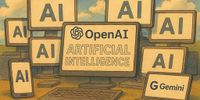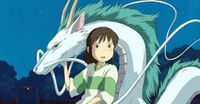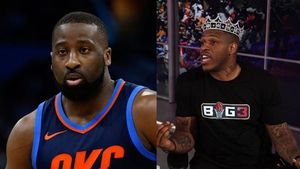This week, the internet had a rare opportunity to transform its selfies and family photos into stunning Studio Ghibli “portraits.” What started as a lighthearted trend quickly took a darker turn. Soon after “Images for ChatGPT” was unveiled on Tuesday, March 25, 2025, a tsunami of images generated in the distinctive Studio Ghibli style flooded social media. X users posted Ghibli-fied versions of their personal photos, popular memes, and public figures like President Donald Trump.
Sam Altman, OpenAI’s chief executive, changed his profile picture on X to a Ghibli-fied image of himself and posted, “grind for a decade trying to help make superintelligence to cure cancer or whatever... wake up one day to hundreds of messages: ‘look I made you into a twink ghibli style haha.'” Altman later joked on X that OpenAI’s servers were “melting” from the demand.
Even the official White House account jumped on the trend, sharing its incredibly bad taste with the image of a weeping woman from the Dominican Republic—recently arrested by U.S. immigration agents—styled as a still from a Studio Ghibli movie. While the internet had its fun, serious ethical questions and copyright issues began to surface. Critics raised concerns over whether OpenAI was unfairly using the work of artists, including Studio Ghibli’s Hayao Miyazaki.
Animated films like My Neighbor Totoro or Spirited Away aren’t made overnight; they require intricate hand-drawn animation and painstaking attention to detail that can take years to complete. According to the Associated Press, the company said the new tool would take a “conservative approach” when it came to mimicking the aesthetics of individual artists. “We added a refusal which triggers when a user attempts to generate an image in the style of a living artist,” OpenAI said in a technical paper posted Tuesday. The company added that it “permits broader studio styles — which people have used to generate and share some truly delightful and inspired original fan creations.”
The Ghibli-gate controversy is just the latest in a series of lawsuits filed by news organizations, authors, and musicians who claim their work was used to train AI models without permission. As for Miyazaki, the founder of Studio Ghibli, his feelings about AI-generated art are clear. In a resurfaced clip from a 2016 documentary, he called AI “an insult to life itself.” Perhaps something to bear in mind before Ghibli-fying a picture of your cat for sharing on the internet.
OpenAI's ChatGPT chatbot was used to generate images evoking the style of Studio Ghibli's Hayao Miyazaki. The trend quickly took on a life of its own, even prompting Altman to joke about being turned into a "twink ghibli style" on X (formerly Twitter). However, OpenAI has since started cracking down on the trend, implementing a confusing range of changes that now often refuse requests to generate images in Ghibli's style.
This viral trend, and OpenAI's chaotic response, reignited a heated debate surrounding copyright and the use of generative AI directly undermining the work of human artists and publishers, including the extremely talented animators at Ghibli. According to Rob Rosenberg, a former general counsel at Showtime and AI expert, Ghibli may actually have grounds for legal action against OpenAI over the situation.
While it's a “complex question” whether the Japanese animation studio would have enough grounds, Rosenberg noted that the company “might have the ability to claim OpenAI has violated the Lanham Act which provides the basis for claims related to false advertising, trademark infringement, and unfair competition.” The Lanham Act, which was enacted in 1946, is the primary federal statute governing trademark law in the US and establishes a national system of trademark registration that allows owners to pursue infringement lawsuits.
"Ghibli could argue that by converting user photos to 'Ghibli-style,' OpenAI is trading off the goodwill of Ghibli’s trademarks, using Ghibli’s identifiable style and leading to a likelihood of confusion among consumers that this function is endorsed or licensed by Studio Ghibli," Rosenberg argued. OpenAI could also be sued for “training its large language models on Studio Ghibli’s copyrighted works,” he added.
OpenAI is already facing several lawsuits over its approach to scouring the internet for training data for its models, including plenty of copyrighted material. Just this week, a federal judge rejected OpenAI's request to throw out a copyright lawsuit filed by the New York Times. The newspaper alleged in late 2023 that the Altman-led company infringed its copyright by using its material without permission to train its AI models.
Mark Zuckerberg's Meta has also been accused of illegally downloading pirated books to train its AI models. But so far, there isn't any legal precedent to determine whether OpenAI broke US copyright law. The company has maintained that “training their models is a fair use under copyright law,” Rosenberg explained, “and therefore an exception to infringement.” The “fair use doctrine” has been core to the ongoing debate surrounding whether AI companies like OpenAI are breaking copyright law.
Whether Ghibli will actually make any legal moves is anyone's guess. On Friday, March 28, 2025, the company told Japanese news outlet NHK that a viral legal document, which claimed to be a cease and desist letter sent by the studio, was fake. “As most courts have not yet ruled on the strength of similar copyright claims, it is unclear whether they would prove successful or not,” Rosenberg told Futurism.
If OpenAI were marketing its platform as a place where consumers could go to turn their photos into 'Ghibli-style' anime, that fact would weigh more strongly in favor of a court finding that OpenAI’s conduct violated the Lanham Act. If the courts were to rule in favor of OpenAI, determining that training AI models on copyrighted material does indeed fall under fair use, we could be heading toward a system where the AI developers will need to compensate copyright holders and credit them where their content is used in producing output.
Apart from questions regarding the possible infringement of copyright, OpenAI could be robbing Ghibli of other ways to monetize. “If Studio Ghibli ever wanted to launch its own tool allowing fans to transform photos into its signature style, OpenAI’s update has essentially taken that business opportunity away,” Rosenberg said. “Worse, this technology could lead to people generating entire animated projects in the Ghibli style and falsely presenting them as authentic.”
It’s similar to asking AI to rewrite a short story in the style of J.K. Rowling and then posting it online as a ‘lost’ Rowling work, blurring the line between homage and outright misrepresentation.







